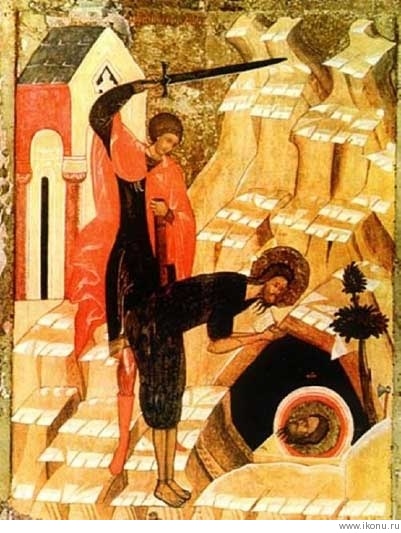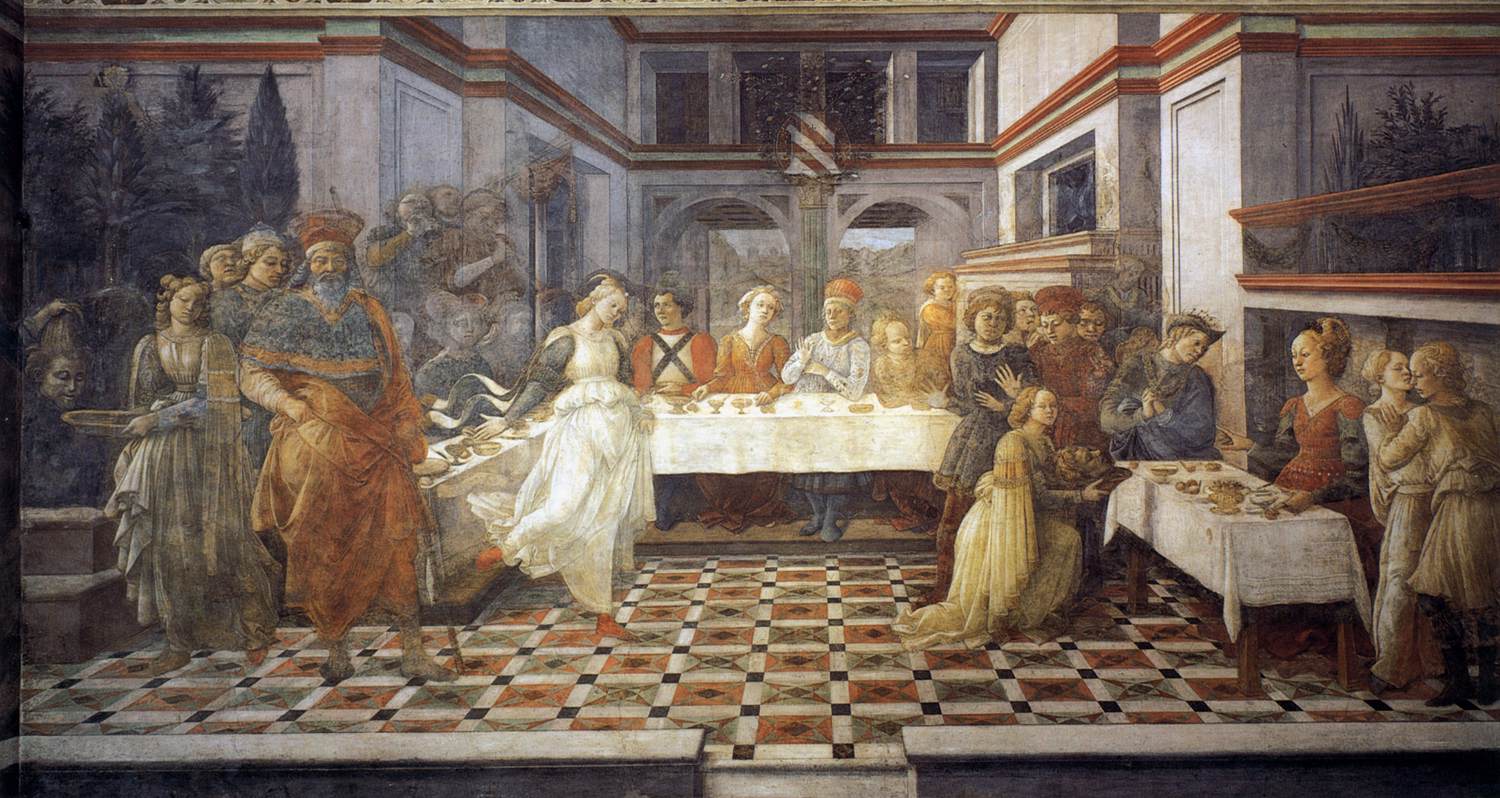Saint Peter Julian Eymard, Priest
Saint Peter Julian Eymard, Priest
Optional Memorial
August 2nd

from Prayer Card
Collect:
O God, who adorned Saint Peter Julian Eymard
with a wonderful love for the sacred mysteries
of the Body and Blood of your Son,
graciously grant
that we, too, may be worthy to receive
the delights he drew from this divine banquet.
Through our Lord Jesus Christ, your Son,
who lives and reigns with you in the unity of the Holy Spirit,
one God, for ever and ever. +Amen.
First Reading: Acts 4:32-35
Now the company of those who believed were of one heart and soul, and no one said that any of the things which he possessed was his own, but they had everything in common. And with great power the apostles gave their testimony to the resurrection of the Lord Jesus, and great grace was upon them all. There was not a needy person among them, for as many as were possessors of lands or houses sold them, and brought the proceeds of what was sold and laid it at the apostles' feet; and distribution was made to each as any had need.
Gospel Reading: John 15:1-8
"I am the true vine, and My Father is the vinedresser. Every branch of Mine that bears no fruit, He takes away, and every branch that does bear fruit He prunes, that it may bear more fruit. You are already made clean by the word which I have spoken to you. Abide in Me, and I in you. As the branch cannot bear fruit by itself, unless it abides in the vine, neither can you, unless you abide in Me. I am the vine, you are the branches. He who abides in Me, and I in him, he it is that bears much fruit, for apart from Me you can do nothing. If a man does not abide in Me, he is cast forth as a branch and withers; and the branches are gathered, thrown into the fire and burned. If you abide in Me, and My words abide in you, ask whatever you will, and it shall be done for you. By this My Father is glorified, that you bear much fruit, and so prove to be My disciples. As the Father has loved Me, so have I loved you; abide in My love. If you keep My commandments, you will abide in My love, just as I have kept My Father's commandments and abide in His love. These things I have spoken to you, that My joy may be in you, and that your joy may be full.
"This is my commandment, that you love one another as I have loved you. Greater love has no man than this, that a man lay down his life for his friends. You are My friends if you do what I command you. No longer do I call you servants, for the servant does not know what his master is doing; but I have called you friends, for all that I have heard from My Father I have made known to you.
****
History:
Founder of the Society of the Blessed Sacrament, and of the Servants of the Blessed Sacrament, born at La Mure d'Isère, Diocese of Grenoble, France, February 4, 1811. From early childhood he gave evidence of great holiness and most tender devotion to the Blessed Sacrament. In 1829, he entered the novitiate of the Oblates of Mary, but illness compelled him to return home. At the age of twenty he entered the grand seminary of Grenoble, and was ordained priest July 20, 1834. He returned to the Marist novitiate in 1839. In 1845 he was appointed Provincial of the Oblates of Mary. His entire spiritual life was centered around the Eucharist. It was the subject of his sermons and exhortations, the object of his worship and prayers. Those who fell under his spiritual direction were taught by his counsel to fix their attention on the Blessed Sacrament.
In January of 1851 Peter Eymard made a pilgrimage to the shrine of Our Lady of Fourvières, and there promised Mary to devote his life to founding a congregation of priests whose principal duty should be to honor the Blessed Sacrament. Having obtained the necessary ecclesiastical permission, he procured a small house in Paris, in which he and a single companion took up their abode. Here, on January 6, 1857, the Blessed Sacrament was exposed, and the nascent community of two members commenced the adoration of the Blessed Sacrament as prescribed by their rule. Their founder received his first encouragement for the work in a laudatory Brief, blessing the work and its author, and signed by Pius IX, in 1857. Five years after, in 1862, Peter Eymard had enough spiritual sons to open a regular novitiate. From this date the congregation spread rapidly, until now its houses may be found in Rome, Belgium, Holland, Spain, Canada, the United States, and South America. The Servants of the Blessed Sacrament, a congregation of cloistered women who carry on perpetual adoration in their convents, were also founded by him in 1858. The Priests' Eucharistic League and the Archconfraternity of the Blessed Sacrament are evidences of his zeal among priests and the faithful. Peter Eymard's writings have been collected, and form four volumes: "The Real Presence", which has been translated into English; Retreat at the Feet of Jesus Eucharistic", "La Sainte Communion", and "L'Eucharistie et la Perfection Chrétienne". These writings have received the approbation of the Holy See. He died August 1, 1868. The author was declared Venerable August 11, 1908 and canonized on December 9, 1962 by Pope John XXIII.
(Principal source - Catholic Encyclopedia - 1913 edition )
***
from Eymard's writings
- Although there are several methods of meditation, St. Eymard suggests one is truly Eucharistic since it is taken from the four ends of the Eucharistic Sacrifice. The method is to divide Eucharistic Adoration into four quarters, Adoration, Thanksgivng, Reparation and Petition. He recommends preparing before going to church the subject of meditation and that one should be practical and consistent with his devotions toward God.
- According to St.Eymard the Stations of the cross was considered among the most important excercise of a retreat. He made the Stations daily until his death.
Source My Eucharistic Day, Rules and Practices recommended by St. Peter Julian Eymard, Prow Books/Franciscan Marytown Press 1954.
The left image`s center shows a monstrance used to hold the Host at benedictions and to display the Consecrated Eucharist at 40 Hours Devotions. Booty Makes Big Discovery On Treasure Coast Wreck Site. (17th century) Gold Pyx. Treasure Beaches Report ^ | July 31, 2014 Posted on 8/2/2014 1:13:34 PM by NYer
1. At that time Herod the tetrarch heard of fame of Jesus.
2. And said to his servants, This is John the Baptist; he is risen from the dead; and therefore mighty works do show forth themselves in him.
3. For Herod had laid hold on John, and bound him, and put him in prison for Herodias' sake, his brother Philip's wife.
4. For John said to him, It is not lawful for you to have her.
5. And when he would have put him to death, feared the multitude because they counted him a prophet.
GLOSS; The Evangelist had above shown the Pharisees speaking falsely against Christ's miracles, and just now His fellow-citizens wondering, yet despising Him; he now relates what opinion Herod had formed concerning Christ hearing of His miracles, and says, At that time Herod the tetrarch heard the fame of Jesus.
CHRYS; It is not without reason that the Evangelist here specifies the time, but you may understand the pride and carelessness of the tyrant inasmuch as he had not at the first made himself acquainted with the things concerning Christ, but now only after long time. Thus they, who in authority are fenced about with much pomp, learn these things slowly, because they do not much regard them.
AUG; Matthew says, at that time, not on that day, or, In that same hour; for Mark relates the same circumstances, but not in the same order. He places this after the mission of the disciples to preach, though not implying that it necessarily follows there; any more than Luke who follows the same order as Mark.
CHRYS; Observe how great a thing is virtue; Herod fears John even after he is dead and philosophizes concerning the resurrection; as it follows, And he said to his servants, This is John the Baptist he is risen from the dead, and therefore mighty works are wrought in him.
RABAN; From this place we may learn how great the jealousy of the Jews was; that John could have risen from the dead, Herod, an alien-born, here declares, without any witness that he had risen: coming Christ, whom the Prophets had foretold, the Jews referred to believe, that He had not risen, but had been carried away by stealth. This intimates that the Gentile heart more disposed to belief than that of the Jews.
JEROME; one of the Ecclesiastical interpreters asks what caused Herod to think that John was risen from the dead; as though we had to account for the errors of an alien, or as though the heresy of metempsychosis was at all supported by this place - a heresy which teaches that souls pass through various bodies after a long period of years - for the Lord was thirty years old when John was beheaded.
RABAN; All men have well thought concerning the power of the resurrection, that the saints shall have greater power after they have risen from the dead, than they had while they were yet weighed down with the infirmity of the flesh; therefore Herod says, Therefore mighty works are wrought in him.
AUG; Luke's words are, John have I beheaded who is he of whom I hear such things? As Luke has was represented Herod as in doubt, we must understand, rather that he was afterwards convinced of that which commonly said - or we must take what he here says to his servants as expressing a doubt - for the admit of either of these acceptation.
REMIG; Perhaps some one may ask how it can be here said, At that time Herod heard, seeing that we have long before read that Herod was dead, and that on that the Lord returned out of Egypt. This question is answered if we remember that there were two Herods. On the death of the first Herod, his son Archelaus succeeded him, and after ten years was sent into exile to Vienne in Gaul. Then Caesar Augustus gave command that the kingdom should be divided into tetrarchies, and gave three parts to the sons of Herod. This Herod then who beheaded John is the son of that greater Herod under whom the Lord was born; and this is confirmed by the Evangelist adding the tetrarch.
GLOSS; Having mentioned this supposition of John's resurrection, because he had never yet spoken of his death, he now returns, and narrates how it came to pass.
CHRYS; And this relation is not set before us as a principal matter, because the Evangelist's only object was to tell us concerning Christ, and nothing beyond, unless so far as it furthered this object. He says then, For Herod had seized John, and bound him.
AUG; Luke does not give this in the same order, but where he is speaking of the Lord's baptism, so that he took beforehand an event which happened long afterwards. For after that saying of John's concerning the Lord, that His fan is in His hand, he straightway adds this, which, as we may gather from John's Gospel, did not follow immediately. For he relates that after Jesus was baptized, He went into Galilee, and thence returned into Judaea, and baptized there near to the Jordan before John was cast into prison. But neither Matthew nor Mark have placed John's imprisonment in that order in which it appears from then own writings that it took place; for they also say that when John was delivered up, the Lord went into Galilee, and after many things there done, then by occasion of the fame of Christ reaching Herod they relate what took place in the imprisonment and beheading of John.
The cause for which he had been cast into prison he shows when he says, On account of Herodias his brother's wife. For John had, said to him, It is not lawful for you to have her.
JEROME; The old history tells us, that Philip the son of Herod the greater, the brother of this Herod, had taken to wife Herodias daughter of Aretas, king of the Arabs; and that the father-in-law, having afterwards cause of quarrel with his son-in-law, took away his daughter, and to grieve her he husband gave her in marriage to his enemy Herod. John the Baptist therefore, who came in the spirit and power Elias,, with the same authority that he had exerted over Ahab and Jezebel, rebuked Herod and Herodias, because that they had entered into unlawful wedlock; it being unlawful while the own brother yet lives to take his wife. He preferred to endanger himself with the King, than to be forgetful of the commandments of God in commending himself to him.
CHRYS; Yet he speaks not to the woman but to the husband, as he was the chief person.
GLOSS; And perhaps he observed the Jewish Law, according to which John forbade him this adultery. And desiring to kill him, he feared the people.
JEROME; He feared a disturbance among the people for John's sake, for he knew that multitudes had been baptized by him in Jordan; but he was overcome by love of his wife, which had already made him neglect the commands of God.
GLOSS; The fear of God amends us, the fear of man torments us, but alters not our will; it rather renders us more impatient to sin as it has held us back for a time from our indulgence.
6. But when Herod's birthday was kept, the daughter of Herodias danced before them, and pleased Herod.
7. Whereupon he promised with an oath to give her whatsoever she would ask.
8. And she, being before instructed of her mother, said, Give me here John Baptist's head in a charger.
9. And the king was sorry: nevertheless for the oath's sake, and them which sat with him at meal, he commanded it to be given her.
10. And he sent, and beheaded John in the prison.
11. And his head was brought in a charger, and given to the damsel: and she brought it to her mother.
12. And his disciples came, and took up the body, and buried it, and went and told Jesus.
GLOSS; The Evangelist having related John's imprisonment. Proceeds to his putting to death, saying, But on Herod's birthday the daughter of Herodias danced in the midst.
JEROME; We find no others keeping their birthday besides Herod and Pharaoh, that they who were alike in their wickedness might be alike in their festivities.
REMIG; It should be known that it is customary not for rich only but for poor mothers also, to educate their daughters so chastely, that they are scarce so much as seen by strangers. But this unchaste woman had so brought up her daughter after the same manner, that she had taught her not chastity but dancing. Nor is Herod to be less blamed who forgot that his was a royal palace, but this woman made it a theater; And it pleased Herod, so that he swore with an oath that he would give her whatsoever she should ask of him.
JEROME; I do not excuse Herod that he committed this murder against his will by reason of his oath, for perhaps he took the oath for the very purpose of bringing about the murder. But if he says that he did it for his oath's sake, had she asked the death of her mother, or her father, would he have granted it or not? What then he would have refused in his own person, he ought to have rejected in that of the Prophet Isidore; In evil promises then break faith. That promise is impious which must be kept by crime; that oath is not to be observed by which we have unwittingly pledged ourselves to evil. It follows, And she being before instructed of her mother said, Give me here John Baptist's head in a charger.
JEROME; For Herodias, fearing that Herod might some time recover his senses, and be reconciled to his brother, and dissolve their unlawful union by a divorce, instructs her daughter to ask at once at the banquet the head of John, a reward of blood worthy of the deed of the dancing.
CHRYS; Here is a twofold accusation against the damsel, that she danced, and that she chose to ask an execution as her reward. Observe how Herod is at once cruel and yielding; he obliges himself by an oath, and leaves her free to choose her request. Yet when he knew what evil was resulting from her request, he was grieved, And the king was sorry, for virtue gains praise and admiration even among the bad.
JEROME; Otherwise; It is the manner of Scripture to speak of events as they were commonly viewed at the time by all. So Joseph is called by Mary herself the father of Jesus; so here Herod is said to be sorry, because the guests believed that be was so. This dissembler of his own inclinations, this contriver of a murder displayed sorrow in his face, when he had joy in his mind. For his oath's sake, and them which sat with him at meal, he commanded it to be given. He excuses his crime by his oath, that his wickedness might be done under a presence of piety. That he adds, and them that sat at meal with him, he would have them all sharers in his crime, that a bloody dish might be brought in a luxurious feast.
CHRYS; If he was afraid to have so many witnesses of his perjury, how much more ought he to have feared so many witnesses of a murder?
REMIG; Here is a less sin done for the sake of another greater; he would not extinguish his lustful desires, and therefore he betakes him to luxurious living; he would not put any restraint on his luxury, and thus he passes to the guilt of murder; for, He sent and beheaded John in prison, and his head was brought in a charger.
JEROME; We read in Roman history, Hieron that Flaminius, a Roman general, sitting at supper with his mistress, on her saying that she had never seen a man beheaded, gave permission that a man under sentence for a capital crime should be brought in and beheaded during the entertainment. For this he was expelled the senate by the censors, because he had mingled feasting with blood, and had employed death, though of a criminal, for the amusement of another, causing murder and enjoyment to be joined together. How much more wicked Herod, and Herodias, and the damsel who danced; she asked as her bloody reward the head of a Prophet, that she might have in her power the tongue that reproved the unlawful nuptials.
GREG; But not without most deep wonder do I consider, that he who in his mother's womb was filled with the spirit of prophecy, than whom there arose not a greater among them that are born of w omen, is cast into prison by wicked men, and is beheaded because of the dancing of a girl, and that a man of such severe life dies for the sport of shameful men. Are we to think that there was any thing in his life which this so shameful death should wipe away? God thus oppresses His people in the least things, because He sees how He may reward them in the highest things. And hence may be gathered what they will suffer whom He casts away, if He thus tortures those He loves.
ID; And John is not sought out to suffer concerning the confession of Christ, but for the truth of righteousness. But because Christ is truth, he goes to death for Christ in going for truth. It follows, And his disciples came, and took up his body, and buried it.
JEROME; By which we may understand both the disciples of John himself, and of the Savior.
RABAN; Josephus relates, that John was sent bound to the castle of Mecheron, and there beheaded; but ecclesiastical history relates that he was buried in Sebastia, a town of Palestine, which was formerly called Samaria.
CHRYS; Observe how John's disciples are henceforth more attached to Jesus; they it is who told Him what was done concerning John; And they came and told Jesus. For leaving all they take refuge with Him, and so by degrees after their calamity, and the answer given by Christ, they are set right.
HILARY; Mystically, John represents the Law; for the Law preached Christ, and John came of the Law, preaching Christ out of the Law. Herod is the Prince of the people and the Prince of the people bears the name and the cause of the whole body put under him. John then warned Herod that he should not take to him his brother's wife. For there are and there were two people, of the circumcision, and of the Gentiles; and these are brethren, children of the same parent of the human race, but the Law warned Israel that he should not take to him the works of the Gentiles and unbelief which was united to them as by the bond of conjugal love. On the birthday, that is amidst the enjoyments of the things of the body, the daughter of Herodias danced; for pleasure, as it were springing from unbelief, was carried in its alluring course throughout the whole of Israel, and the nation bound itself thereto as by an oath, for sin and worldly pleasures the Israelites sold the gifts of eternal life.
She (Pleasure), at the suggestion of her mother Unbelief, begged that there should be given her the head of John, that is, the glory of the Law; but the people knowing the good that was in the Law, yielded these terms to pleasure, not without sorrow for its own danger, conscious that it ought not to have given up so great glory of its teachers. But forced by its sins, as by the force of an oath, as well as overcome by the fear, and corrupted by the example of the neighboring princes, it sorrowfully yields to the blandishments of pleasure. So among the other gratifications of a debauched people the head of John is brought in a dish, that is by the loss of the Law, the pleasures of the body, and worldly luxury is increased. It is carried by the damsel to her mother; thus depraved Israel offered up the glory of the Law to pleasure and unbelief. The times of the Law being expired, and buried with John, his disciples declare what is done to the Lord, coming, that is, to the Gospels from the Law.
RABAN; Otherwise; Even at this day we see that in the head of the Prophet John the Jews have lost Christ, who is the head of the Prophets.
JEROME; And the Prophet has lost among them both tongue and voice.
REMIG; Otherwise; The beheading of John marks the increase of that fame which Christ has among the people, as the exaltation of the Lord upon the cross marks the progress of the faith; whence John had said, He must increase, but I must decrease.
Catena Aurea Matthew 14
Catholic Culture
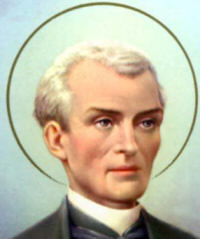
Collect: Lead us, Lord God, to imitate the constancy of Saint Eusebius in affirming the divinity of your Son, so that, by preserving the faith he taught as your Bishop, we may merit a share in the very life of your Son. Who lives and reigns with you in the unity of the Holy Spirit, one God, for ever and ever.
O God, who adorned Saint Peter Julian Eymard with a wonderful love for the sacred mysteries of the Body and Blood of your Son, graciously grant that we, too, may be worthy to receive the delights he drew from this divine banquet. Through our Lord Jesus Christ, your Son, who lives and reigns with you in the unity of the Holy Spirit, one God, for ever and ever.
o Basic French Bread
o Religion in the Home for Elementary School: August
o Religion in the Home for Preschool: August
o Prayer to Saint Peter Julian Eymard
o Novena In Honor of Saint John Marie Vianney
o Litany of the Most Blessed Sacrament
o Eucharistic Stations Of The Cross
o Devotion to the Real Presence and Growth in Sanctity | Fr. John A. Hardon S.J.
o My Eucharistic Day | St. Peter Julian Eymard
o My Eucharistic Day: Tuesday | Unknown
o Worship the Eucharistic Jesus and Become Who You Are | Thomas Norris
· Ordinary Time: August 2nd
· Optional Memorial of St. Eusebius of Vercelli, bishop and Optional Memorial of Saint Peter Julian Eymard, priest
Old Calendar: St. Alphonsus Mary de Liguori, bishop, confessor & doctor; St. Stephen I, pope & martyr; Our Lady of the Angels (Hist)
Born in La Mure, France, Saint Peter became a parish priest in 1834 and joined the Marists five years later. He fostered Eucharistic adoration throughout his life and founded a religious order of priest-adorers of the Holy Eucharist who came to be known as the Priests of the Blessed Sacrament.
St. Eusebius was a Roman priest of the fourth century. According to the acts relating his martyrdom he was condemned by Constantius, the Arian Emperor, to be starved to death in a room in his own house. He was buried in the cemetery of St. Calixtus. His cult has always enjoyed special favor in Rome and his house was transformed into a church.
According to the 1962 Missal of St. John XXIII the Extraordinary Form of the Roman Rite, today is the feast of St. Alphonsus de Liguori. His feast in the Ordinary Form of the Roman Rite is now celebrated on August 1. It is also the commemoration of St. Stephen I, a Roman, who ruled the Church from 254 to 257 during the reign of the Emperor Valerian. He is famous for his correspondence with St. Cyprian about the validity of baptism administered by heretics. The pope's martyrdom was the beginning of Valerian's persecution.
Historically today is the feast of Our Lady of the Angels.
St. Peter Julian Eymard
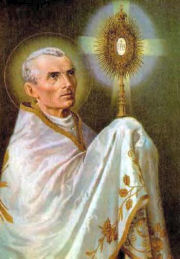
Born in La Mure d'Isere in southeastern France, Peter Julian's faith journey drew him from being a priest in the Diocese of Grenoble (1834) to joining the Marists (1839) to founding the Congregation of the Blessed Sacrament (1856). In addition to those changes, Peter Julian coped with poverty, his father's initial opposition to Peter's vocation, serious illness, a Jansenistic striving for inner perfection and the difficulties of getting diocesan and later papal approval for his new religious community.
His years as a Marist, including service as a provincial leader, saw the deepening of his Eucharistic devotion, especially through his preaching of Forty Hours in many parishes.
The Congregation of the Blessed Sacrament began working with children in Paris to prepare them to receive their first Communion. It also reached out to non-practicing Catholics, inviting them to repent and begin receiving Holy Communion again. He was a tireless proponent of frequent Holy Communion, an idea given more authoritative backing by Pope Pius X in 1905.
Inspired at first by the idea of reparation for indifference to the Eucharist, Peter Julian was eventually attracted to a more positive spirituality of Christ-centered love. Members of the men's community, which Peter founded, alternated between an active apostolic life and contemplating Jesus in the Eucharist. He and Marguerite Guillot founded the women's Congregation of the Servants of the Blessed Sacrament.
Peter Julian Eymard was beatified in 1925 and canonized in 1962, one day after Vatican II's first session ended.
Excerpted from the Saint of the Day, Leonard Foley, O.F.M.
Things to Do:
- Make a holy hour today. You might find this work — My Eucharistic Day — from the Catholic Culture Library helpful. It was compiled from the writings of Saint Peter Julian Eymard with the permission and encouragement of the Blessed Sacrament Fathers.
- From the Catholic Culture library: Audience with God in Your Parish.
St. Eusebius of Vercelli
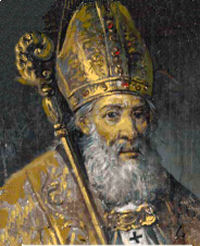
Eusebius was the founder of the canons regular, priests living under a religious rule and dedicated to pastoral work. The canons regular was the immediate result of the rise of monasticism in the East, and St. Eusebius of Vercelli saw the possibilities of this new movement for the clergy. His example was imitated all over the West and brought about a renewal of clerical life. He was born in Sardinia and as a child was taken to Rome, where he became a member of the Roman clergy under Pope Julius. Consecrated for the see of Vercelli in 344, he gathered his clergy into a community life, founding also the dioceses of Turin and Embrun. In 355, he attended the Council of Milan as legate of Pope Liberius, which defended St. Athanasius against those Western bishops intimidated by the emperor. When Eusebius was ordered along with other bishops to condemn Athanasius, he refused, insisting instead that they all sign the Nicene Creed. When threatened by the emperor, Eusebius stood his ground and told the emperor he had no right interfering in Church matters.
In anger, the emperor sent Eusebius into exile in Palestine, where he was severely mistreated by the Arians. He was moved around from place to place and after his release by the Emperor Julian he consulted with Athanasius in Alexandria on the Arian crisis. Returning to Italy, he joined with St. Hilary of Poitiers in opposing the Arian bishop of Milan and returned to Vercelli amid the rejoicing of his people.
Eusebius is considered by many to be the author of the Athanasian Creed, and a copy of the Gospels written in his own hand is preserved in the cathedral at Vercelli. He died on August 1, 371, his courage in suffering for the faith inspiring other bishops to oppose the Arian heresy.
Excerpted from the The One Year Book of Saints by Rev. Clifford Stevens
Things to Do:
- Read the account of the Life of St. Eusebius from the Golden Legend by Jacobus de Voragine.
- St. Eusebius of Vercelli refused to "go along with the crowd," even when threatened by an emperor, and he suffered long and cruelly for his convictions. Sometimes we have to oppose others, especially in matters that are important, and how we do it is as important as that we do it. We should never lose our Christian kindness and gentle manner, even in opposing others, but it should be very clear where we stand.
- Arianism was a Christological view held by followers of Arius in the early Christian Church. They denied that Christ and God the Father were of the same fundamental essence, seeing the Son as a created and inferior being to the Father. (See Hilaire Belloc's chapter on Arianism from The Great Heresies.) Read what the Catholic Encyclopedia says about this heresy. Say the Apostles Creed or an Act of Faith and thank God for the gift of the true Faith.
- The Christology of Jehovah's Witnesses is also a form of Arianism; they regard Arius as a forerunner of Charles Taze Russell, the founder of their movement. Imitate St. Eusebius by learning how to defend your faith. Read these articles from the Catholic Culture Library: The Watchtower's Flickering Light, Christ's Divinity Proved by the JW Bible and "Unless You Drink of My Blood...".
St. Stephen I
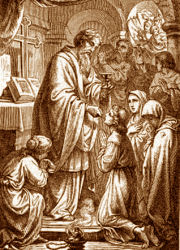
He is said to have been the chief deacon of Pope Lucius and recommended by him as his successor. He was soon involved in the case of two Spanish bishops who apparently had under persecution bought letters of safety from the persecutors. One of them, Martial, was deposed, and the other, Basilides, resigned, but then went to Rome and got the pope to reinstate him. He "imposed upon our colleague Stephen," declared the other Spanish bishops, "who lives a long way off and did not know the true facts of the case." St. Cyprian agreed that the two offenders were unfit to continue in office and the affair seems to have provoked a certain discord between him and Stephen, but what happened further is no longer known. Then Cyprian wrote to the pope in support of the bishops of Gaul, urging him to take action against the bishop of Arles, Marcian, who was accused of Novatianist rigorism but the result of this case is not on record either.
An important controversy then arose on the subject of baptism administered by heretics. St. Cyprian and three African synods declared that such baptism was null and void, and that one so baptized must be baptized anew upon becoming a Catholic; this innovation was supported by many bishops in Asia. St. Stephen faithfully upheld the ancient accepted teaching that, other things being equal, baptism given by heretics is valid, and was violently abused by Firmilian of Casarea in Cappadocia in consequence. "No innovation must be introduced," declared the pope, "but let that be observed which tradition has handed down," and refused to receive the delegates of the African synod that supported St. Cyprian in the year 256. Stephen thought of excommunicating the innovators, writes St. Augustine, "but, having the pity of holy charity, he judged it better to abide in union. The peace of Christ triumphed in their hearts," but the disagreement continued.
St. Stephen sent material succour to the faithful in the provinces of Syria and Arabia, and is said to have taken the first step in the emergence of liturgical vestments: the Liber Pontificalis states that he ordered that clothes worn by clerics at church services were to be kept for that purpose, and not taken into daily use or worn by laymen.
Excerpted from the A Dictionary of the Popes, Donald Attwater
Our Lady of the Angels
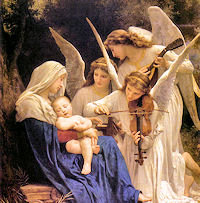
From the earliest days of the Church. Mary has held the title Our Lady Queen of Angels. At the Annunciation, at the Nativity, at her Assumption into heaven, and finally at her Coronation as Queen of Angels and Men, angels have been associated with Our Lady. There are a number of famous shrines dedicated to Mary under this title, including the Basilica of Santa Maria degli Angeli at Assisi, where the great St. Francis recognized his vocation; the church in Rome which was designed and executed by Michelangelo on ruins from the time of Diocletian; the shrine of St. Mary of the Angels in Engeberg, Switzerland; Notre Dame des Anges near Lurs, France; the shrine dedicated to Our Lady of Angels at Boulogne, France; the church of Our Lady of the Angels in London, England; and the Mission of Our Lady of the Angels in Los Angeles.
Excerpted from A Litany of Mary by Ann Ball

